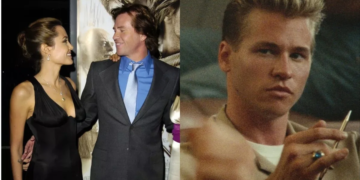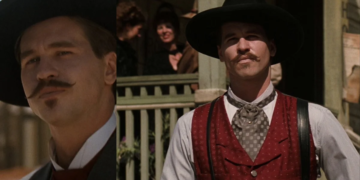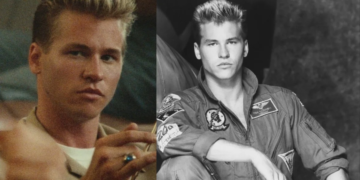Val Kilmer’s role in Heat (1995), directed by Michael Mann showcases his powerful acting and the strong ability of a supporting cast. While he plays Chris Shiherlis, a supporting role in a film dominated by the onscreen pairing of Al Pacino and Robert De Niro, Kilmer delivers a performance that leaves a lasting impression on the audience. His work in Heat portrays his ability to enrich a film’s narrative without needing to overshadow the main characters.
Val Kilmer’s Role In Heat Shows His Genius As An Actor

Chris Shiherlis (Val Kilmer), is the youngest and perhaps most volatile member of Neil McCauley’s (De Niro) crew. He’s skilled, loyal, and deeply immersed in the criminal world. However, he also exhibits a level of emotional vulnerability and instability that sets him apart from the more calculated McCauley. Kilmer brings controlled chaos to Chris — a mix of bravado, recklessness, and a deep yearning for connection. His emotional aspect is present, particularly in his tumultuous relationship with his wife Charlene (Ashley Judd). This inner conflict, between his love for his family and his loyalty to the crew, is never spelled out through dialogue. Kilmer communicates it through subtle expressions, body language, and emotional intensity. It’s a performance that trusts the audience to read between the lines.
One of Kilmer’s standout scenes without a single line of dialogue occurs near the end of the film. McCauley silently signals to Chris from afar during a police stakeout, warning him that it’s not safe to approach. Kilmer gives a quick, flickering expression, a blend of recognition, disappointment, and heartbreak, before turning and vanishing into the crowd. That brief moment, in a film filled with explosive set pieces and powerhouse monologues, speaks volumes about his character.
ALSO READ: What is the Last Film of Val Kilmer?
Val Kilmer As A Supporting Actor
Val Kilmer’s role in Heat doesn’t try to dominate the leads. Given that he’s acting opposite Pacino and De Niro, would be a futile and misguided effort. Instead, he complements their performances, helping to build the film’s moral ambiguity. His interactions with De Niro’s McCauley, in particular, show a deep camaraderie and respect, often communicated more through shared silences. There’s a sense that Chris looks up to Neil as both a mentor and father figure, and Kilmer plays this dynamic subtly but convincingly.
Michael Mann expressed his fondness for Kilmer by complimenting his authenticity as an actor, citing how deeply Kilmer immersed himself in preparation for the role. Like the rest of the crew, Kilmer trained extensively with weapons and tactics to convincingly portray a professional criminal. The infamous downtown LA shootout, one of the most technically challenging and influential action sequences in cinema, benefits enormously from Kilmer’s realistic handling of firearms. The way Kilmer reloads his rifle mid-combat became so iconic that it has reportedly been used as a training example by military instructors. This level of detail and realism underlines Kilmer’s commitment to embodying the role fully, even in action-heavy sequences.
Val Kilmer As An Actor
Val Kilmer’s role in Heat demonstrates his willingness to immerse himself in a role, his respect for the ensemble process, and his ability to create a lasting impact with minimal dialogue. As Chris Shiherlis, Kilmer shows that great acting can be quiet, layered, and deeply human.
What Heat ultimately reveals about Kilmer is that he is not just a leading actor, he is a man with the instincts and humility of a character actor. He understands how to serve the story, how to elevate a scene, and how to give a character internal life even when the script doesn’t provide exposition. Kilmer doesn’t need long monologues or dramatic outbursts to make his role memorable. Instead, he uses silence and understated emotional beats to etch his presence into the core of his character.















Discussion about this post